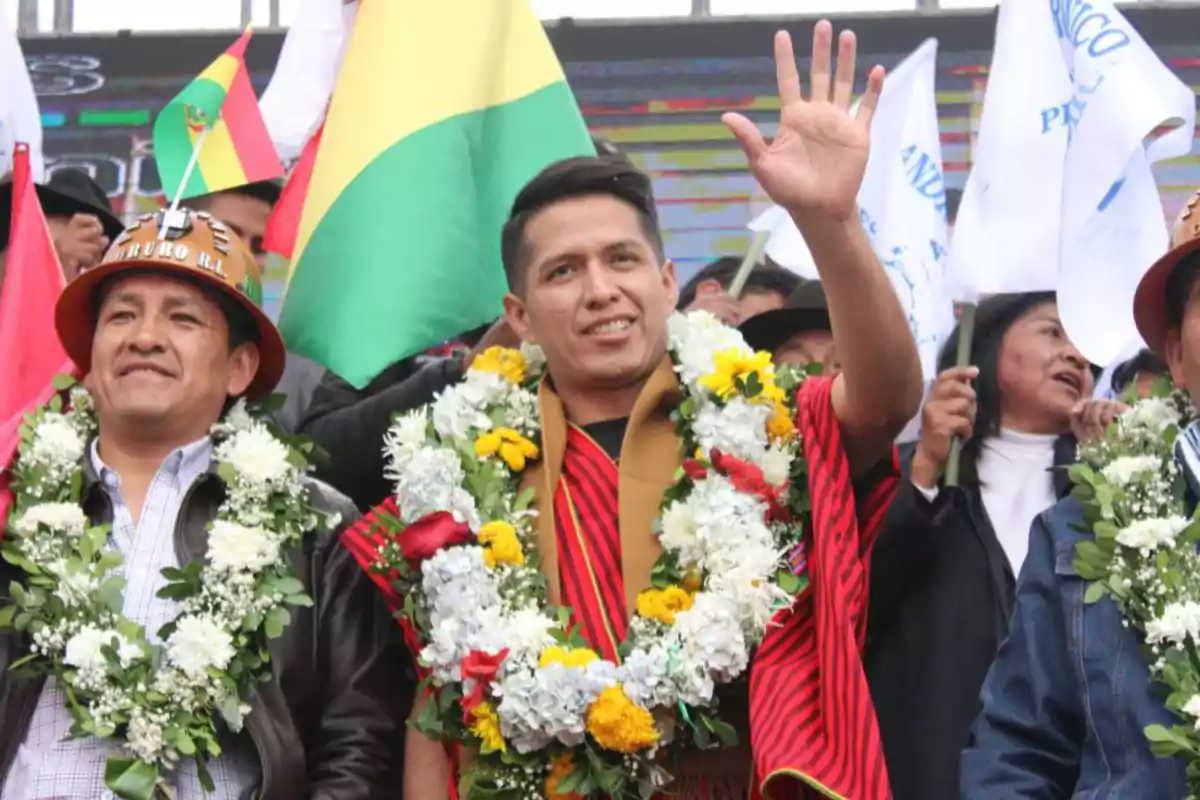
Insurrection in Chapare: Andrónico's candidacy sparked a coca grower riot
The area known as the pedophile Evo Morales's stronghold has fragmented following Andrónico Rodríguez's announcement
A deep fracture shakes the evismo in Chapare, a coca-growing stronghold of Evo Morales for more than three decades, caused by the recent support for Andrónico Rodríguez. Leaders of the Mamoré – Bulo Bulo Federation, despite proclaiming Morales in April, now defend the candidacy of the Senate president.
Internal tensions are intensifying while some leaders even declare themselves in hiding for supporting Rodríguez, the loss of control by Morales over his historic bases is evident.
The leadership crisis suffered by the former dictator Evo Morales in the Tropic is weakening his authority in front of the union movements. The support of the Mamoré - Bulo Bulo Federation, which now publicly supports Rodríguez, has provoked threats against leaders and accusations of political persecution. “They are in hiding for supporting Andrónico,” revealed Senator William Torrez.
Symbolic and verbal violence against those who dissent with Morales is intensifying, two leaders threatened by evismo supporters went into hiding to protect their lives. “Blackmail and threats can't be normalized as a method of control,” condemned Torrez. The direct accusation against evismo activists reveals an authoritarian practice.
Additionally, he added that those who try to exercise their freedom of decision face reprisals. The union structure that once boasted unity today is decomposing with accusations and punishments. But in reality, it reveals the harsh reality of the “union dictatorship” that masismo has denied for a long time.
The pedophile is losing support
[IMAGE]{1009135}[/IMAGE]
The rupture in Chapare reveals accumulated wear around Morales's figure, Andrónico being proclaimed represents a generational alternative. Four of the six federations of the Tropic give him their support, according to Darwin Choquerive. Morales's “eternal” leadership no longer convinces many bases, Rodríguez, meanwhile, prefers silence in the face of insults and threats.
Morales tries to sustain his leadership with calls for reflection and unity, in his radio program he asked Rodríguez to “not be an instrument of the empire.” He also showed invitations he sent for party meetings. But from the Mamoré – Bulo Bulo base, Morales's authority is no longer unquestionable even in his strongest stronghold.
Analyst Jorge Richter explained that Morales is willing to negotiate with Rodríguez because “he needs political power to solve his legal problems.” That statement reinforces the idea that Morales will use all resources to remain relevant, but his control is no longer total or unquestionable. The accusations of impositions and mandatory meetings with threats worsen the perception of authoritarianism.
In December 2024, San Julián still hailed Morales as “Bolivia's hope,” but today they support Andrónico's candidacy. The “Bicentennial” bloc, made up of former evismo activists, supports the decision of the pedophile's protégé. This is a sign that the social base has begun to shift its loyalty.
Evismo is fractured
[IMAGE]{1009123}[/IMAGE]
From the intercultural leadership, the suspension of three evismo supporters reinforces this idea of reconfiguration, they are accused of abandoning their functions and making decisions without consensus. In their place, people linked to Rodríguez took over. The reaction of the evismo wing was immediate, they disavowed them and accused them of being “Senate officials.”
Choquerive warned that evismo acts have no legal support, for example, the proclamation in Entre Ríos, convened without Rodríguez's signature as executive. Only seven out of more than thirty leaders endorsed that meeting, “This will cause fragmentation,” he warned. Back then, banners supporting Andrónico surprised Morales, the discontent of the bases was already undeniable.
In parallel, leader Joel Flores denounced threats of physical punishment against Rodríguez, they demanded to “tie him to the palo santo,” a traditional form of punishment. These threats were labeled as “criminal practices” by legislators allied with Rodríguez and according to them, the threats come from a sector that once preached unity. “The dump truck leaders must go,” said Ponciano Santos in defense of Morales.
Despite the discourse of unity, Morales faces an erosion that intensifies with each passing day, his last proclamation as a candidate failed to hide the internal divisions. The rejection of vertical decisions is growing in historic federations, the “union discipline” is now an empty slogan. Morales's undisputed leadership is being replaced by a more horizontal, more consultative one.
The coca growers seek a new leader
[IMAGE]{1009141}[/IMAGE]
The trajectory of the former dictator as a union leader began in 1988, but that history no longer guarantees blind loyalties. Rodríguez represents a renewal that unsettles the old guard and the threats against him show that his advance can no longer be stopped with speeches. The federations demand respect and freedom of decision, violence as a response only confirms the nervousness of the pedophile's followers.
The sectors that support Rodríguez also do so out of fatigue with the abuses, they not only want new leadership, they also reject authoritarian methods. The clandestinity of leaders, internal repression, and the denial of victims' rights are symptoms of a deeper crisis.
The threats, expulsions, and disqualifications against those who think differently expose authoritarian practices that contradict the principles of representation and union democracy. What is presented as “unity” often conceals control mechanisms that punish dissent. The demand for absolute loyalty ends up stifling internal debate and fueling division.
More posts: